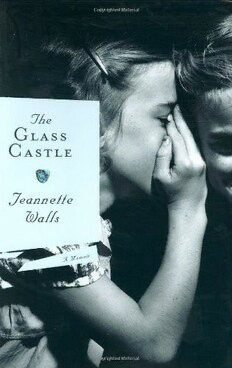
The Glass Castle: A Memoir PDF
02005·0.25 MB·English
Most books are stored in the elastic cloud where traffic is expensive. For this reason, we have a limit on daily download.
Preview The Glass Castle: A Memoir
Description:
Amazon.com Review Jeannette Walls's father always called her "Mountain Goat" and there's perhaps no more apt nickname for a girl who navigated a sheer and towering cliff of childhood both daily and stoically. In *The Glass Castle*, Walls chronicles her upbringing at the hands of eccentric, nomadic parents--Rose Mary, her frustrated-artist mother, and Rex, her brilliant, alcoholic father. To call the elder Walls's childrearing style laissez faire would be putting it mildly. As Rose Mary and Rex, motivated by whims and paranoia, uprooted their kids time and again, the youngsters (Walls, her brother and two sisters) were left largely to their own devices. But while Rex and Rose Mary firmly believed children learned best from their own mistakes, they themselves never seemed to do so, repeating the same disastrous patterns that eventually landed them on the streets. Walls describes in fascinating detail what it was to be a child in this family, from the embarrassing (wearing shoes held together with safety pins; using markers to color her skin in an effort to camouflage holes in her pants) to the horrific (being told, after a creepy uncle pleasured himself in close proximity, that sexual assault is a crime of perception; and being pimped by her father at a bar). Though Walls has well earned the right to complain, at no point does she play the victim. In fact, Walls' removed, nonjudgmental stance is initially startling, since many of the circumstances she describes could be categorized as abusive (and unquestioningly neglectful). But on the contrary, Walls respects her parents' knack for making hardships feel like adventures, and her love for them--despite their overwhelming self-absorption--resonates from cover to cover. *--Brangien Davis* From Publishers Weekly Starred Review. Freelance writer Walls doesn't pull her punches. She opens her memoir by describing looking out the window of her taxi, wondering if she's "overdressed for the evening" and spotting her mother on the sidewalk, "rooting through a Dumpster." Walls's parents—just two of the unforgettable characters in this excellent, unusual book—were a matched pair of eccentrics, and raising four children didn't conventionalize either of them. Her father was a self-taught man, a would-be inventor who could stay longer at a poker table than at most jobs and had "a little bit of a drinking situation," as her mother put it. With a fantastic storytelling knack, Walls describes her artist mom's great gift for rationalizing. Apartment walls so thin they heard all their neighbors? What a bonus—they'd "pick up a little Spanish without even studying." Why feed their pets? They'd be helping them "by not allowing them to become dependent." While Walls's father's version of Christmas presents—walking each child into the Arizona desert at night and letting each one claim a star—was delightful, he wasn't so dear when he stole the kids' hard-earned savings to go on a bender. The Walls children learned to support themselves, eating out of trashcans at school or painting their skin so the holes in their pants didn't show. Buck-toothed Jeannette even tried making her own braces when she heard what orthodontia cost. One by one, each child escaped to New York City. Still, it wasn't long before their parents appeared on their doorsteps. "Why not?" Mom said. "Being homeless is an adventure." Copyright © Reed Business Information, a division of Reed Elsevier Inc. All rights reserved.
See more
The list of books you might like
Most books are stored in the elastic cloud where traffic is expensive. For this reason, we have a limit on daily download.
